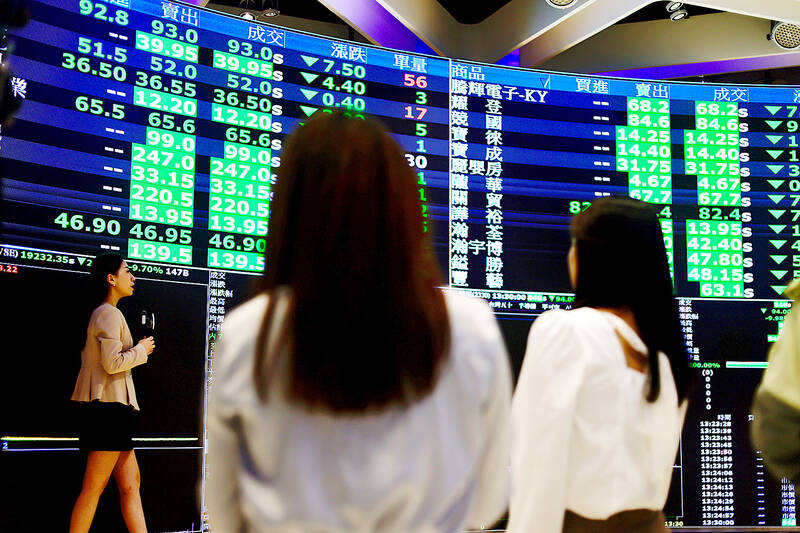Taiwanese sentiment toward the economy turned sharply pessimistic this month, as concerns over US “reciprocal” tariffs weighed on consumer confidence, cooled investment interest and softened home-buying enthusiasm, a survey released yesterday by Cathay Financial Holding Co (國泰金控) showed.
The latest results showed a steep deterioration in public perceptions of both the current and future economic outlook.
The index measuring views on the current economic situation plunged to minus-44.5, while the outlook index fell to minus-41.3, both registering steep declines, Cathay Financial said.

Photo: RITCHIE B. TONGO, EPA-EFE
Consumer sentiment has clearly deteriorated, with the index for durable goods consumption falling to minus-18.3, the willingness to sell homes sliding to minus-20.3 and home-buying intention diving to minus-50.3, the survey found.
Respondents also adopted a more cautious outlook on GDP growth and inflation for the year, the company said.
On average, the public expects GDP growth of 2.63 percent, with 62 percent of respondents predicting the final figure would fall below 3 percent.
While the Directorate-General of Budget, Accounting and Statistics (DGBAS) in February forecast 3.14 percent GDP growth for this year, the National Development Council last week said that the economy could shrink by as much as 1.61 percent — bringing growth down to just 1.53 percent — due to the potential impact of looming US tariffs.
Meanwhile, the public expects consumer prices to rise by 2.33 percent — higher than the DGBAS’ forecast of 1.94 percent — with about 70 percent of respondents anticipating inflation to exceed the 2 percent mark, the survey showed.
Stock investors also shared the bleak sentiment, weighed down by concerns over a potential global economic slowdown, Cathay Financial said.
The index measuring views on the local stock market dropped to minus-23.3, while the risk appetite index edged down to 3.4, reflecting growing caution among individual investors.
Adding to the pessimism, 55 percent of respondents reported that housing prices in their area had risen by 3 percent over the past six months. Nearly half — 48 percent — expect a similar increase in the next six months, although most agreed the housing market had shown signs of slowdown, the survey found.
The survey showed that consumers and investors are bracing for a tougher environment marked by slowing economic growth, rising inflation and greater market volatility amid ongoing geopolitical tensions and global trade uncertainty, Cathay Financial said.
The survey was conducted from April 1 to 7 and gathered 13,693 valid online responses from clients of Cathay Life Insurance Co (國泰人壽) and Cathay United Bank Co (國泰世華銀行), both wholly owned subsidiaries of Cathay Financial.

Taiwan will prioritize the development of silicon photonics by taking advantage of its strength in the semiconductor industry to build another shield to protect the local economy, National Development Council (NDC) Minister Paul Liu (劉鏡清) said yesterday. Speaking at a meeting of the legislature’s Economics Committee, Liu said Taiwan already has the artificial intelligence (AI) industry as a shield, after the semiconductor industry, to safeguard the country, and is looking at new unique fields to build more economic shields. While Taiwan will further strengthen its existing shields, over the longer term, the country is determined to focus on such potential segments as

UNCERTAINTY: Innolux activated a stringent supply chain management mechanism, as it did during the COVID-19 pandemic, to ensure optimal inventory levels for customers Flat-panel display makers AUO Corp (友達) and Innolux Corp (群創) yesterday said that about 12 to 20 percent of their display business is at risk of potential US tariffs and that they would relocate production or shipment destinations to mitigate the levies’ effects. US tariffs would have a direct impact of US$200 million on AUO’s revenue, company chairman Paul Peng (彭雙浪) told reporters on the sidelines of the Touch Taiwan trade show in Taipei yesterday. That would make up about 12 percent of the company’s overall revenue. To cope with the tariff uncertainty, AUO plans to allocate its production to manufacturing facilities in

COLLABORATION: Given Taiwan’s key position in global supply chains, the US firm is discussing strategies with local partners and clients to deal with global uncertainties Advanced Micro Devices Inc (AMD) yesterday said it is meeting with local ecosystem partners, including Taiwan Semiconductor Manufacturing Co (TSMC, 台積電), to discuss strategies, including long-term manufacturing, to navigate uncertainties such as US tariffs, as Taiwan occupies an important position in global supply chains. AMD chief executive officer Lisa Su (蘇姿丰) told reporters that Taiwan is an important part of the chip designer’s ecosystem and she is discussing with partners and customers in Taiwan to forge strong collaborations on different areas during this critical period. AMD has just become the first artificial-intelligence (AI) server chip customer of TSMC to utilize its advanced

Chizuko Kimura has become the first female sushi chef in the world to win a Michelin star, fulfilling a promise she made to her dying husband to continue his legacy. The 54-year-old Japanese chef regained the Michelin star her late husband, Shunei Kimura, won three years ago for their Sushi Shunei restaurant in Paris. For Shunei Kimura, the star was a dream come true. However, the joy was short-lived. He died from cancer just three months later in June 2022. He was 65. The following year, the restaurant in the heart of Montmartre lost its star rating. Chizuko Kimura insisted that the new star is still down